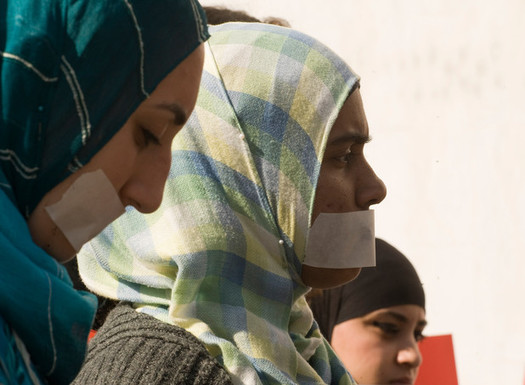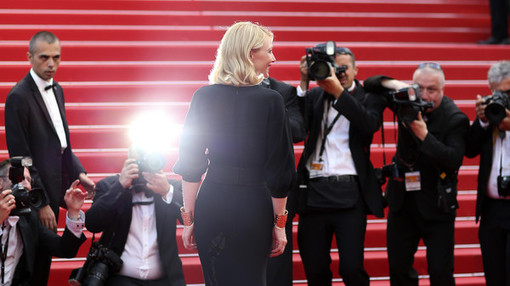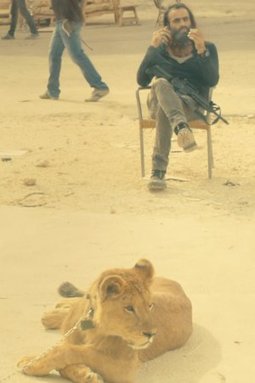All that glitters not TV gold for ‘Lebanon’s Kardashians’
They were touted as Lebanon’s answer to reality TV icons the Kardashians, but the stars of “The Sisters” have been dismissed as not only unrepresentative but even worse — boring.
In the sleek apartment where their show is filmed, Alice, Nadine and Farah Abdel Aziz teeter around on high heels, in full make-up at all times.
They defend their show as a realistic glimpse into their lives, and a chance to show how smart Lebanese women are.
But Lebanese viewers seem to disagree, criticising the series for focusing on a small sliver of the upper class and failing to provide the whiff of scandal that animates the infamous “Keeping up with the Kardashians” US reality show.
“The Sisters” began in March with much fanfare and local media coverage.
It usually features the slender siblings in Beirut’s most expensive restaurants, designer shops, and beauty salons, often with friends, each visit usually documented with a selfie or two.
“We want people to see what Lebanese women are like,” says Alice, 26, the trio’s self-appointed chief, her tiny figure draped in a bright blue cut-off top and dazzling jewelry.
And the sisters do represent a segment of Lebanon’s most ostentatious wives and daughters, who enjoy similarly extravagant excursions and designer styles.
But they say they still respect the Middle East’s conservative values, which rule out the discussions of body parts, boyfriends and sex that spice up the Kardashians’ hit series.
“They live in a certain environment, and we live in a certain environment. Their lifestyle is really different,” Farah, 22, said of the Kardashians.
Lebanon, a multi-confessional country of four million, is considered among the most liberal in the Arab world with women generally free to wear revealing attire and alcohol widely available.
But parts of Lebanese society remain deeply conservative, and female representation in politics is minimal: only four of Lebanon’s 128 members of parliament are women.
– ‘We aren’t perfect’ –
Alice curates the “Style in Beirut” Instagram page, where she posts photos of glamorous outfits to nearly 200,000 followers.
Nadine, 23, is a professional model and is often seen exercising, while Farah, a recent graduate, is working towards becoming a news anchor with the help of her life coach.
“Do I look good? Does the lighting look good on me?” Farah asks Nadine in an impromptu photo shoot in Beirut’s downtown, carrying their fluffy white puppy, Stella.
“We want to show people that we aren’t perfect,” Alice explains in accented English.
“The message isn’t just to be beautiful, to go out, fashion, and that’s it… People can see how smart Lebanese women are, how they don’t have to rely on their parents,” she insists.
But that claim is rejected by many Lebanese women, who say the show ignores educated, hardworking, and down-to-earth women.
In the show’s first episode, Nadine is late to pick up an exasperated Alice from the airport because her car runs out of petrol.
“Whenever we have any problems, Daddy is always there to fix them for us,” Nadine says to the camera, asking her father to send their driver to collect her.
That has frustrated Lebanese activists who are eager to see more representative depictions of the country’s women in the media.
“We try to fight this stereotype picture of Lebanese women, and they always manage through shows and movies to keep showing it,” says Reem Kaedbey, 27, an activist and researcher on governance.
“The majority of Lebanese women can’t afford this lifestyle.”
– ‘It’s an insult’ –
“It’s an insult to everything women have tried to accomplish during recent Lebanese history,” says Sareen Akharjalian, a programmer and cartoonist who mocked the sisters on her website.
With many Lebanese women holding challenging jobs, “this show mocks our entire being,” she said.
The Abdel Aziz sisters are unfazed by the criticism and say upcoming episodes will feature new career developments.
Already, Farah has tried her hand at TV presenting, while Alice is preparing to launch a fashion line for dogs.
Ultimately though, the show’s undoing appears to have been the lack of scandal that is central to the success of “Keeping up the Kardashians”, which focuses on the lives of sisters Kourtney, Kim and Khloe, and is now in its 10th season.
Kaedbey for example admits the Kardashians are a “guilty pleasure” for her, but says “The Sisters” is boring by comparison, plagued by “bad acting”.
The station that airs “The Sisters” did not respond to requests for viewer figures, but online views on YouTube have gone from 242,000 for its first episode to just 18,000 for its ninth.
“Being attractive helps, but it’s not what keeps people on the air… We’re left with story lines that can’t really go in depth,” says May Farah, a media professor at the American University of Beirut.
“If we can’t have that, if we just have them talking about fashion, is it really going to captivate an audience?”
Source: en-maktoob.news.yahoo.com














